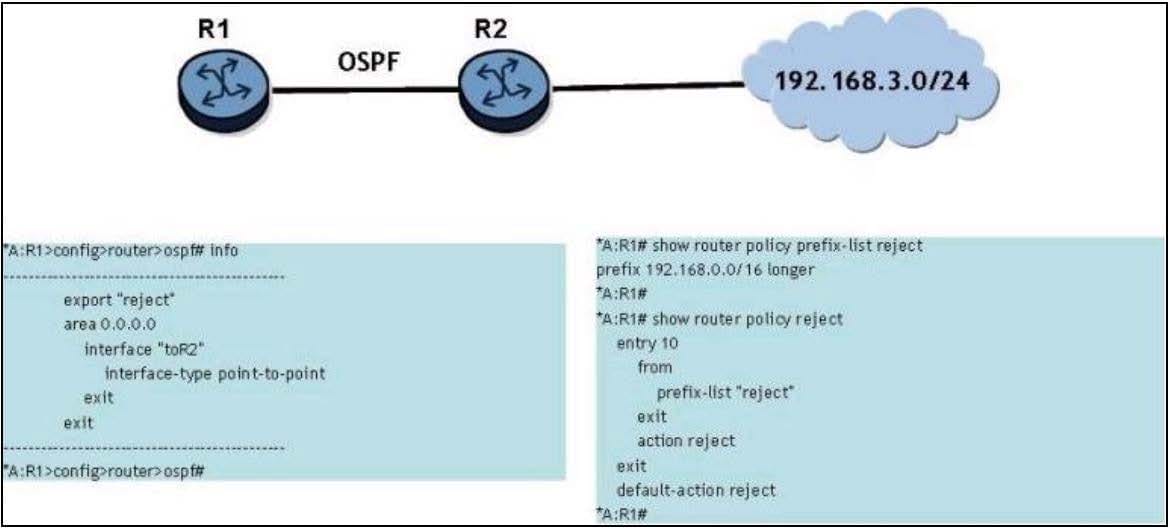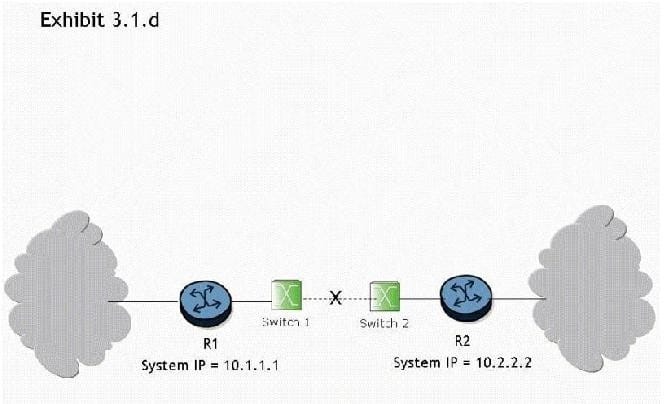Exam Details
Exam Code
:4A0-C01Exam Name
:Nokia NRS II CompositeCertification
:Nokia CertificationsVendor
:NokiaTotal Questions
:922 Q&AsLast Updated
:Aug 14, 2025
Nokia Nokia Certifications 4A0-C01 Questions & Answers
-
Question 761:
Which of the following devices can originate an opaque LSA?
A. TE enabled OSPF routers
B. Backbone router only
C. ABR only
D. ASBR only
-
Question 762:
What type of LSA is used to flood information about prefixes from one OSPF area to other attached areas?
A. Type 1
B. Type 3
C. Type 4
D. Type 7
-
Question 763:
Click the exhibit button.

Router R2 advertises the network 192.168.3.0/24 to router R1 via OSPF. A route policy has been constructed to discard the route on router R1; however, it is not working. What is the problem?
A. The prefix list reject should be "192.168.3.0/16 exact".
B. Router R1 should be configured as an OSPF "asbr".
C. The policy "reject" should be set for import rather than export.
D. The policy was likely not "committed" after creation.
E. This is not possible because OSPF cannot use import policies.
-
Question 764:
What value should the AFI be set to for locally administered addressing?
A. 1
B. 49
C. 47
D. 45
E. 39
-
Question 765:
When redistributing OSPF into RIP V2 what must be taken into consideration for the redistribution to take place?
A. The metric must be set accordingly for RIP
B. The subnet mask must be removed from the OSPF route
C. You must divide the cost of the OSPF route by three
D. The router must be configured as an ASBR
-
Question 766:
Click the exhibit button.

What triggers convergence of the routing protocol when the link between switch 1 and switch 2 goes down?
A. Convergence is triggered when the adjacency between routers R1 and R2 drops as a result of Hello timeouts. At this point, both routers R1 and R2 re-compute their link state database and send updates to their adjacent routers. Once the process is complete for all routers, the networks have converged.
B. Convergence is triggered when the physical interfaces between routers R1 and R2 go down. At this point, both routers R1 and R2 re-compute their link state database and send updates to their adjacent routers. Once the process is complete for all routers, the networks have converged.
C. Convergence will not be triggered because switches cannot run routing protocols between them.
D. Convergence is triggered when the switches notify the routers about the link state information. At this point, both routers R1 and R2 re-compute their link state database and send updates to their adjacent routers. Once the process is complete for all routers, the networks have converged
E. Convergence is triggered when an LSA is sent from router R1 to router R2 to indicate that the link is down. At this point, both routers R1 and R2 re-compute their link state database and send updates to their adjacent routers. Once the process is complete for all routers, the networks have converged.
-
Question 767:
What is the source IP address in an OSPF update?
A. 224.0.0.5
B. 224.0.0.6
C. The unicast IP address of the interface the update is being sent on.
D. The system address of the router
-
Question 768:
Click the exhibit button.
[Missing the exhibit]
Which of the following statements best describes the format of data traffic sent from the PC to the server?
A. The source IP address will be the address of the PC, and the destination IP address will be the system IP address of router R1; the source MAC address will be the MAC address of the PC, and the destination MAC address will be the MAC address of the router R1 port connected to the PC.
B. The source IP address will be the address of the PC, and the destination IP address will be the IP address of the router R1 port connected to the PC, the source MAC address will be the MAC address of the PC, and the destination MAC address will be the MAC address of the router R1 port connected to the PC.
C. The source IP address will be the address of the PC, and the destination IP address will be the IP address of the server, the source MAC address will be the MAC address of the PC, and the destination MAC address will be the MAC address of the server.
D. The source IP address will be the address of the PC, and the destination IP address will be the IP address of the server; the source MAC address will be the MAC address of the PC, and the destination MAC address will be the MAC address of the router R1 port connected to the PC.
-
Question 769:
How are LSPs acknowledged on IS-IS broadcast links?
A. The LSP is acknowledged by sending a PSNP PDU.
B. The LSP is acknowledged by sending an LSP PDU.
C. The LSP is acknowledged by sending a Hello PDU.
D. LSP are not acknowledged on broadcast links. The DIS sends periodic CSNPs to maintain database synchronization
-
Question 770:
What are the types of networks supported on an Alcatel-Lucent 7750 SR for OSPF? (Choose 2)
A. Broadcast
B. Non-Broadcast Multi-Access
C. Point-to-Point
D. Point-to-Multipoint
Related Exams:
4A0-100
Nokia IP Networks and Services Fundamentals4A0-101
Nokia Interior Routing Protocols4A0-102
Nokia Border Gateway Protocol for Internet Routing4A0-103
Nokia Multiprotocol Label Switching4A0-104
Nokia Services Architecture4A0-105
Nokia Virtual Private LAN Services4A0-106
Nokia Virtual Private Routed Networks4A0-107
Nokia Quality of Service4A0-108
Nokia Multicast Protocols4A0-109
Alcatel-Lucent Triple Play Services
Tips on How to Prepare for the Exams
Nowadays, the certification exams become more and more important and required by more and more enterprises when applying for a job. But how to prepare for the exam effectively? How to prepare for the exam in a short time with less efforts? How to get a ideal result and how to find the most reliable resources? Here on Vcedump.com, you will find all the answers. Vcedump.com provide not only Nokia exam questions, answers and explanations but also complete assistance on your exam preparation and certification application. If you are confused on your 4A0-C01 exam preparations and Nokia certification application, do not hesitate to visit our Vcedump.com to find your solutions here.